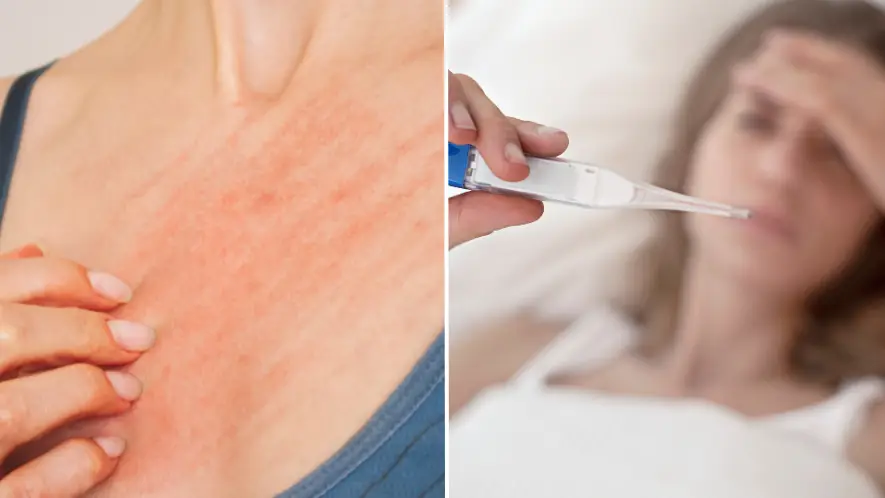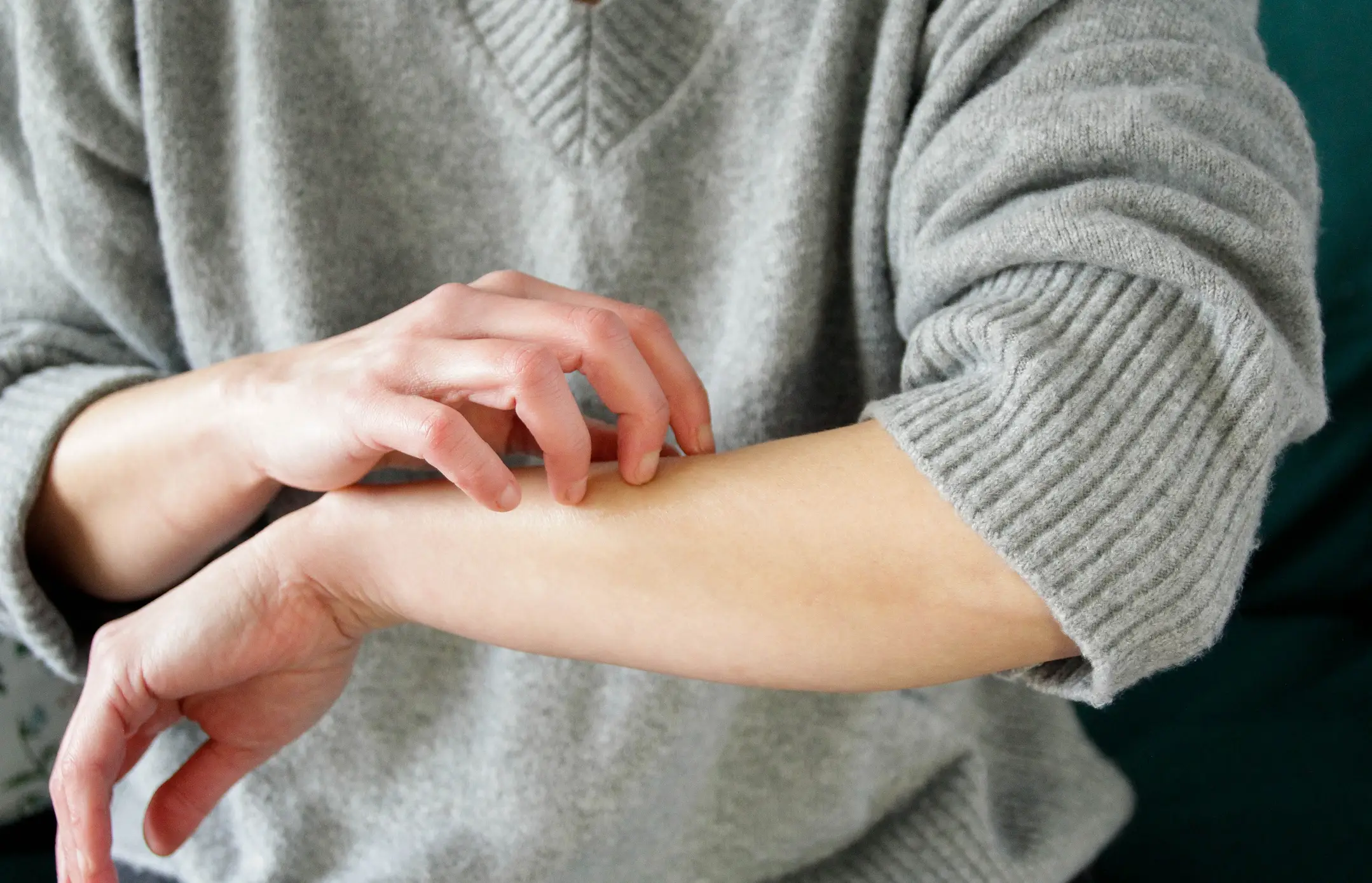
Winter is a period where everyone seems to not be feeling their best.
But it's clear it's not just a common cold or flu we need to worry about this season, as we've now got a handful of 'Victorian diseases' which are now on the rise.
In fact, there's such a surge in these parasitic skin infections in the country that experts have issued an urgent warning on what to do if you're concerned you've got one, given the 'unusually high' rate across the UK.

Advert
Such diseases are far from a thing of the past as the likes of scabies, syphilis, and scurvy are actually coming back to the modern age in a way that hasn't been seen for quite some time.
So, without further ado, let's get into these three diseases, what on earth they are, how they're each contracted, and how to treat it if you do end up getting diagnosed with one.
Scabies
Scabies is caused by tiny mites that burrow into the skin to lay their eggs and cases are on the rise across the UK, particularly in the north of England.
Chair of the Royal College of GPs, Professor Kamila Hawthorne, said: "The rate of scabies presentations in general practice is above the five-year average and rising, with the north of England seeing a spike in scabies cases, but incidences are still infrequent."
Scabies symptoms
One of the major symptoms of scabies is some pretty intense itching, especially at nighttime.
Another is noticeably raised rashes or spots.
The NHS warns that these spots may appear reddish in colour before turning into tiny spots and 'you should be able to feel them'.
While it can be anywhere on the body, apart from the head and neck, the rash is very common between the fingers, around the wrists, under the arms, and around the waist, groin, and bottom.

When to speak to your GP if you have scabies
You need to speak to your GP as soon as you notice the symptoms, so that a pharmacist can prescribe you a cream or lotion as treatment to get it cleared up ASAP.
You can return to school or work after the first treatment has been completed but, if you’re still experiencing itchiness two to four weeks after completing your treatment, you should contact your GP for a check-up.
As scabies is super infectious, it's important everyone in your home be treated at the same time, as it can sometimes take up to eight weeks for a scabies rash to even appear.
Additionally, anyone you’ve had sexual contact with in the past eight weeks should also be treated.
How to reduce the spread of scabies
Apart from getting your treatment sorted as soon as possible, you can also take further measures to reduce the spread.
The NHS advises those with scabies put a big wash on of all bedding and clothing at 60C or higher on the first day of treatment.
And for any clothing that can't be washed, be sure to whack it in a sealed bag for three days until the mites die.
Cleaning your floors, as well as hoovering your carpets and furniture, including the armchairs and sofa, will also help to reduce the spread.
Additionally, be sure to not share bedding, clothing, or towels with someone with scabies.
Also, it's recommended that anyone with scabies does not have sex or close physical contact until they have completed the full course of treatment.
Find out more about scabies on the official NHS website here.

Syphilis
Next up is the sexually transmitted disease syphilis which, according to The Sunday Times, is at an all-time high since over seven decades ago.
The UK Health Security Agency said there were 9,500 cases of syphilis in England last year, up 10 per cent in a year and the highest figure since 1948.
Chief medical officer, Professor Sir Chris Whitty, said a fall in public funding was making the situation worse, saying syphilis is a 'very dangerous disease with multiple complications'.
Syphilis symptoms
Symptoms of syphilis, which was rife in the 18th and 19th centuries, include small sores on your penis, vagina, or around your bottom, sores in other areas, including in your mouth or on your lips, hands, or bottom, as well as a rash on the palms of your hands and soles of your feet.
Other symptoms include white patches in your mouth, flu-like symptoms such as a high temperature, headaches and tiredness, and swollen glands, patchy hair loss on the head, beard, and eyebrows.

When to speak to your GP if you have syphilis
The NHS warns: "It can take three weeks or more for the symptoms of syphilis to appear after you're infected.
"Sometimes the symptoms can improve or go away completely, but if you have not been treated the infection is still in your body."
This effectively means you can still pass it on and you're at risk of getting serious problems later on.
So, you should go to your GP ASAP if you or a sexual partner have symptoms of syphilis or if a sexual partner has told you they have syphilis (or another sexually transmitted infection, for that matter).
"Having a test is the only way to confirm if you have syphilis," the NHS adds. "If you do, treatment will need to be started as soon as possible."
How to reduce the spread of syphilis
Using condoms consistently and correctly is the best way to prevent syphilis and many other STIs.
Find out more about syphilis on the official NHS website here.

Scurvy
Scurvy is an easily treatable disease, which was first discovered in sailors during the Renaissance era.
Rates of scurvy, which is caused by vitamin C deficiency, are reportedly increasing amid the cost of living crisis and the rise of weight loss surgery, reports the Independent.
Doctors have also warned in the BMJ of a resurgence in people developing scurvy due to not eating enough fruit and vegetables.
Scurvy symptoms
Symptoms include feeling very tired and weak all the time, feeling irritable and sad all the time, and joint, muscle, or leg pain as well as swollen, bleeding gums, with teeth sometimes falling out.
Other symptoms are developing red or blue spots on the skin, usually on the legs, and feet and skin that bruise easily.
Although scurvy is rare, you may be more at risk if you don't eat enough fresh fruits and vegetables, eat very little food at all, smoke ( smoking reduces how much vitamin C your body gets from food), and if have a long-term dependency on drugs or alcohol that affects your diet.

When to speak to your GP if you have scurvy
The NHS advises seeing your GP if you or your child are at risk of scurvy and feel very tired and weak all the time, feel irritable and sad all the time, have joint, muscle, or leg pain, or have wounds that reopen or are not healing well.
How to prevent a vitamin C deficiency
The best way to prevent a vitamin C deficiency and get enough vitamins and minerals is to eat a healthy, balanced diet, the NHS explains.
"It's important to speak to a GP or midwife before taking any supplements or making changes to your diet during pregnancy or while breastfeeding," the official website adds.
Find out more about scurvy on the official NHS website here.